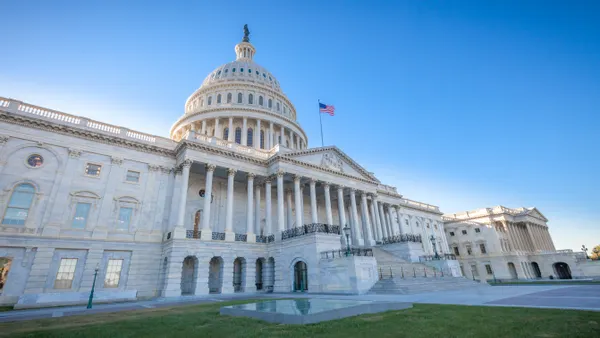Dive Brief:
- The American Hotel & Lodging Association praised a Texas court’s blocking of the National Labor Relations Board’s joint employer rule Friday, calling it a “huge win” for hoteliers.
- The new rule would have made hotel companies and their franchisees jointly responsible for employees, thus involving hotel groups more in on-property disputes. In its decision, the U.S. District Court for the Eastern District of Texas reinstated the NLRB’s 2020 rule, which did not hold hotel groups jointly responsible for franchisees’ workers.
- Originally scheduled to go into effect in December, the rule’s start date was delayed twice amid pushback from franchise industry players. Hotel industry advocates like AHLA were some of the new rule’s fiercest opponents.
Dive Insight:
In a statement, AHLA’s Interim President and CEO Kevin Carey called the decision in Texas “a huge win for hoteliers, the lodging industry, and franchised businesses.”
“The ruling will critically reestablish franchisees' control over their own businesses, restore certainty in the relationships between employees and employers, and prevent costly confusion with independent contractors,” he said.
AHLA has pushed back against the rule for months. In November, the association’s then-CEO Chip Rogers — who resigned from his position as AHLA president and CEO last week — said it would be “devastating to the hotel industry,” calling the rule “a partisan gambit to force unions on hotel franchisees and their employees.”
In a statement sent to Hotel Dive’s sister publication HR Dive, however, the NLRB suggested it may appeal the court’s decision.
“The District Court’s decision to vacate the Board’s rule is a disappointing setback, but is not the last word on our efforts to return our joint-employer standard to the common law principles that have been endorsed by other courts,” said NLRB Chairman Lauren McFerran, in the statement. “The Agency is reviewing the decision and actively considering next steps in this case.”
Casey, meanwhile, said AHLA will “stand ready to fight any attempt by the NLRB to appeal this decision.”
The NLRB rule that was blocked is similar to one that was already in effect from 2015 to 2017, when the Obama administration appointed board members. A board appointed by Trump later reversed the rule.
“The rule has become controversial in that it has been swinging based on the political makeup of the Board — causing affected employers to have to see-saw between policies and practices that could have a significant impact on their business with respect to financial exposure and organizational structure,” said Lara Shortz, leader of the Labor and Employment group at law firm Michelman & Robinson, speaking to Hotel Dive in November.
In November, AHLA was among the business groups that pushed back against the latest iteration of the rule, stemming from Biden administration appointees.
Those groups included the International Franchise Association, which has strongly opposed the rule, and the National Restaurant Association. Angelo Amador, executive director of the Restaurant Law Center, said in a statement for the NRA that the rule’s blocking “is a decisive win for franchise operators.”










